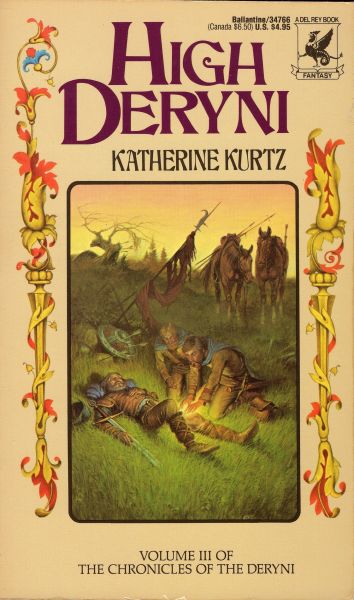These Castle Walls
High Deryni (The Chronicles of the Deryni, volume 3)
By Katherine Kurtz

31 Mar, 2024
1973’s High Deryni is the third and final volume in Katherine Kurtz’s Ruritanian historical fantasy series, The Chronicles of the Deryni. High Deryni is by no means the final Deryni book.
The reign of young King Kelson of Gwynedd may be as short-lived as Kelson is young. Kelson is beset by racist rabble-rousers, fanatical priests, and what amounts to an evil wizard/warlord. Also, recent revelations about Kelson’s heritage suggest that the boy king is as terrible as some of his enemies claim.
Two centuries ago, the Deryni used their magical powers to conquer the Eleven Kingdoms. Since the overthrow of the Deryni, their former victims have long memories. The Church views the Deryni as inherently suspect. Many humans see Deryni as little short of demons. It was not to Kelson’s advantage to be revealed as at least half-Deryni. Nor does it count in the king’s favor that he counts some Deryni amongst his advisors.
Standing against Kelson: anti-Deryni demagog Warin de Grey, who leads a small army of rebels. Were this not sufficient vexation, de Grey is allied to Archbishop Edmund Loris, who isn’t going to let minor legal niceties prevent him from excommunicating Kelson and all who support him. With the Church against him, many who might otherwise support Kelson will abandon him lest they risk damnation.
Kelson must therefore somehow sway the Church back to his side, thus neutralizing Loris. Having done so, dealing with de Grey should be less difficult. All Kelson need to do is sneak into a sealed city without the guards spotting Kelson and his retinue, then somehow convince the neutral clerics to risk public outrage by siding with Kelson. How hard could that be?
However, this leaves the matter of King Wencit Furstán of Torenth. Wencit is ambitious, ruthless, and a full-blooded Deryni, plus he has an army. Wencit’s magic and his army may ensure a win. Not only that: he has a further weapon of which Kelson is unaware. One of Kelson’s supposed allies is working for Wencit.
~oOo~
The author has kindly added a note that regardless of the human and Deryni belief that people of mixed heritage have reduced access to Deryni magic, this is not true. If a person has any degree of magical aptitude, they potentially have access to the full suite of Deryni powers.
Magic may be a misnomer. Deryni gifts might be more akin to psionics, interpreted as magic by 12th century primitives who don’t even own digital watches. The powers are certainly genetic, which will no doubt have interesting consequences once eugenics and genetic engineering make their appearance1. If we accept psionics as an explanation, then the Deryni books could be compared to Garrett’s Lord Darcy books, which describe magic as psionics.
The worst that can be said of this book: the ending was not satisfactory. Having established that the stakes are high and that the forces arrayed against Kelson are nearly insurmountable, Kelson and his retinue easily overcome challenges. Powerful foes present themselves only to fold easily. People with little reason to trust Kelson and company do trust him. Calamitous events loom, only to be evaded without difficulty. Most annoying: a major plot-thread is resolved at the last moment by the sudden intervention of a third party. The effect is as if Fortinbras appeared in the Danish court to handle the matter of Claudius for Hamlet. God may or may not be on Kelson’s side, but the author very definitely is.
High Deryni is available here (Amazon US), here (Amazon Canada), here (Apple Books), here (Barnes & Noble), here (Chapters-Indigo), and here (Words Worth Books). I did not find it at Amazon UK.
1: The Deryni gifts are so useful that one wonders how they have not spread through the population as rapidly as did the genes for lactose tolerance. Perhaps magic is of recent origin? If it is, then the genes would not have had time to spread, which would explain why Kurtz’s 12th century is, in so many ways, like our own non-magical world.
Overthinking is the first step on the path to a happy life.
